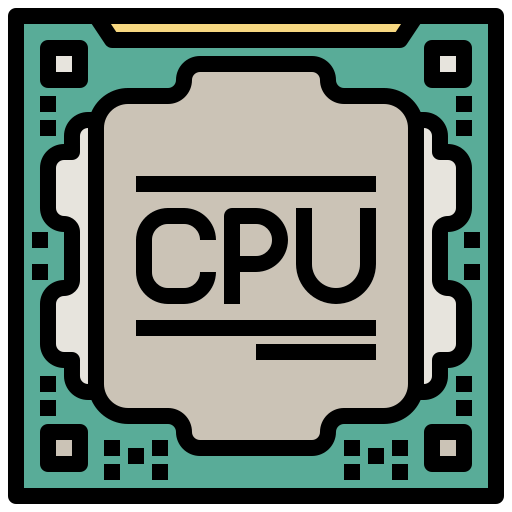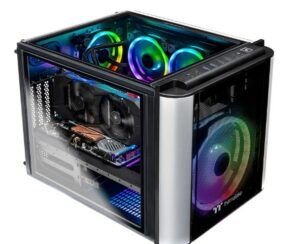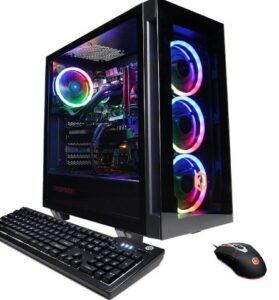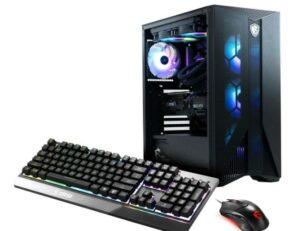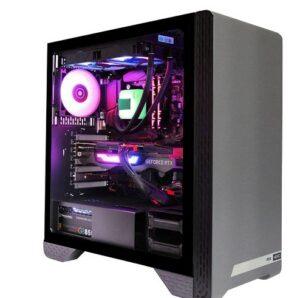How do I choose a gaming CPU?
We know CPUs are durable and can last for years with proper maintenance, but PC technology constantly evolves.
State-of-the-art gaming CPUs use high-speed clock speeds, large cache sizes, and many threads, allowing for improved performance when paired with advanced compatible hardware.
The best CPU for gaming has a sound chip, with the highest score, within your price range.
It could be a higher Intel Core i9 12900K, or an AMD Ryzen 9 5900X, although it could also be good for your deer for the Intel Core i5 12400.
It is the cost of performance and what you use your PC for most.
The good news is that there are a lot of great processors out there right now at affordable prices.
In fact, with the launch of Intel’s 12th General Elder Lake family, the best processor for gaming at the height of Intel’s lineup is not All Songs, All Dancing Halo Chip, but a little beyond the pecking order.
Gaming is a field that benefits from this evolution.
The CPU significantly affects many requirements of the latest games, including:
- Frame rates
- Crowd animations
- Destruction physics
- Draw distance
- Streaming
Ultimately, selecting the best gaming processor for your computer depends on what you expect from gaming requirements and how you use your system.
Step 1: Find out what you need in the CPU.
Before deciding on a CPU, think about your PC’s use. To help you decide, learn more about gaming laptops vs. gaming desktops.
Next, consider how you intend to use your new system. For this article, we will assume that you are using your PC for gaming but that tasks such as streaming, video editing, and professional applications also affect your choice of hardware.
Can Keep these ideas in mind as we cover terms like raw numbers and clock speeds that are important to know when comparing CPUs.
Step 2: Learn how the CPU works.
Once you know what kind of system you are gaming on, the next step is to equip yourself with some basic information about how the processor affects the performance of your system.
Knowing the clock speed and essential counting factor in the gaming experience will help ensure that you buy a CPU that allows you to do whatever you want.
CPU core count
Modern gaming CPUs have multiple cores. Each of these cores acts as an additional processor, allowing the CPU to process multiple instructions simultaneously.
Many PC games use multiple cores, but when it comes to CPU-intensive tasks outside of gaming, such as video encoding or complex programs to create high-quality content, high-core numbers are increasingly important. Gets done.
The additional core can be helpful if you use your CPU for tasks other than gaming, such as streaming gameplay while you play.
Even a single-core CPU with a very high clock speed can’t handle the workload that a CPU with more cores can.
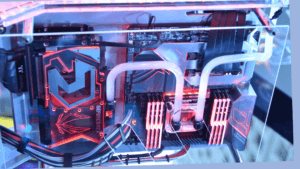
CPU clock speed
The clock speed of a CPU (also called the clock rate or frequency) is the number of cycles that a CPU can run in one second.
It is an essential but fundamentally important consideration when choosing a CPU. Modern CPUs run billions of cycles per second, so clock speeds are measured in GHz.
You can read more about clock speeds and CPU cycles here to find out how these metrics could potentially affect your gameplay experience.
In general, the higher the clock speed per core, the better. When choosing a new CPU, find the maximum clock speed within your budget and ensure you have the cores/threads needed for your workload.
Step 3: Consider additional CPU features.
In addition to simple measurements such as clock speed and basic counting, there are some features to keep in mind in selecting the CPU.
Integrated graphics
Most CPUs use integrated graphics, meaning they can display pictures on screen without a single GPU. Integrated graphics can be helpful, especially when troubleshooting potential issues with a
exclusive GPU.
Video editing and streaming can benefit from integrated graphics as well. With Intel® Quick Sync Video, for example, video files can be encoded and decoded in a fraction of the time, freeing up system resources for other tasks. Is.
Only CPUs with the F slot, such as the Intel® CoreTM i7TM i7-12700KF, lack integrated graphics. Users who know they will only be using a single GPU in their system should look into these.
Features of laptop
You may be surprised that many laptops perform the same tasks as desktops while gaming. Modern laptops are designed to keep up the gaming workload even if you prioritize performance over the rest.
When choosing a gaming laptop, look for Intel® CPUs with H designation, such as Intel® Core ™ i7-10750H. These processors are specifically designed for portable PCs to prioritize power consumption and battery life.
Overclocking
Overclocking is something to keep in mind when making a CPU purchase. Tools like Intel® Performance Maximizer make it easier than ever to achieve a stable overclock using overclocking2.
The Intel® Core TM i7 TM 12700K CPU, for example, has the “K” designation at the end of its name, which can help you get the most out of your hardware.
It’s a clue that you built the CPU to handle higher clock speeds. You can overclock an unlocked CPU with the proper hardware, including a cooling system and a motherboard that supports overclocking.
Step 4: Find the suitable Intel® Core ™ processor for you.
Now that we’ve covered the basics let’s find out which CPU performance level is right for you.
The generation of the CPU often defines processor and chipset capabilities. The greater the number, the more features and cores, and threads the CPU will have.
Clock speeds, and cache sizes. These performance levels offer a helpful way to find the balance of the features you are looking for.
Top premium quality CPU for gaming you need.
| IMAGE AND SPEC | PRICE LINK |
|
|
Check out the latest price here. |
|
|
Check out the current price here. |
|
|
Check out the current price here. |
|
|
Check out the current price here. |
Step 5: Check the benchmarks.
While these basics will hopefully provide you with tools for choosing a CPU, there are likely to be some specific CPU models that offer the desired performance within your budget.
The best way to look for benchmarks that reflect how you intend to use your computer.
For example, find a specific game with the processor model you are considering and review performance metrics such as FPS to see the gaming CPU you want.
The needs and expectations of Other hardware will also need to be considered, such as the system’s GPU and RAM, but this can be an excellent place to start looking for the correct CPU.
Final Thought
To get the best gaming and streaming experience, you’ll need a computer with an Intel® CoreTM i7 CPU and at least 8GB of RAM.
An Intel® CoreTM i9 CPU provides an even smoother gaming experience if you’re looking for less impact.
Related article:
How Much Would It Take To Build My Own GPU and CPU?(Explained)
